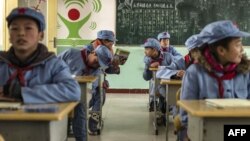At a time when China is working to silence criticism of a new push to strengthen ideological teaching at schools, and keep textbooks promoting Western values out of the classroom, a professor has warned in a state-media interview that the growing education debate runs the risk of becoming too extreme.
In an interview with the Communist Party-backed People’s Daily website, Nankai University President Gong Ke said that some of the response to the campaign was dangerously similar to the Anti-Rightist Campaign of 1957 and the Cultural Revolution. During those two periods intellectuals were brutally persecuted in China.
In the interview, Gong said that while some believe the ranks of China’s academies of higher learning should be cleansed, purified and rectified, he did not agree.
"That is the mentality of 1957 and 1966,” he said.
The debate picked up steam recently when China's education minister warned about the danger of Western values in textbooks.
China’s propaganda authorities have ordered the media to disseminate the ideas of Education Minister Yuan Guiren's, who is spearheading the campaign, and those of Maoist scholar Zhu Jidong and to delete any criticisms, according to an apparently leaked censorship directive published by the China Digital Times.
Zhu, a scholar at the Chinese Academy of Social Sciences, has voiced his support for Education Minister Yuan Guiren’s perspective that China's youth are at risk and more controls are needed. He argues that businessmen, lawyers, artists and professors who have criticized the minister should be dealt with harshly.
Gong said that while there are those within the rank and file of teachers whose political views may be problematic, or who have lifestyle, financial or academic failings, more trust was needed.
“You cannot generalize, you cannot use them to represent the broad core of teachers,” he said.
Gong also warned that such an approach runs the risk of repeating the mistakes leftists made in the past, and going from one extreme to another.
Tightening control
Before stepping into office, hopes were high for reforms under China’s new leader Xi Jinping. Xi was only a teenager when his father was jailed during the Cultural Revolution and like many others during that era, his classes were halted so that students could criticize and fight their teachers.
Because of his experiences many thought he would avoid such extremes, but concerns continue to grow as he cracks down on civil society, tightens access to the Internet and now sets his sights on institutions of higher learning.
The new campaign not only focuses on ridding campuses of harmful western ideals, but also about restructuring the way institutions approach study in Marxism and Communist Party ideology.
Some have even warned about the threat scholars who have studied overseas pose to universities. But that was an idea the state-run Global Times recently shot down in an editorial entitled “Returned Scholars not a foe of Core Values.”
In it, the nationalistic tabloid argued that China can only be successful by continuing along the path of reform and opening up.
“Promoting ideological education in colleges can be considered a reform, with the goal of fostering a new generation of talented people who are faithful to their nation and its people,” it said.
But it also added that given China’s integration with the world, its education cannot be a closed system.
Hong Kong student protests
Some analysts have argued that Xi Jinping’s shift in attention to universities is an indirect result of the student protests in Hong Kong. China has long worried about Arab Spring-like protests reaching its shores.
Others argue that eventually the education minister may have to reverse course, given the unusually public backlash that continues.
Russell Moses, the dean of academics and faculty at the Beijing Center for Chinese Studies, has a different view.
In an article Moses recently wrote on The Wall Street Journal’s China RealTime blog, he said the campaign wasn’t really about anxiety of unrest at colleges in China or even educational reform.
“The real fear is that another of Xi’s campaigns, the broad and ongoing anti-corruption crackdown is beginning to focus on colleges,” he said.
And that presents conservatives with a threat, or maybe an opportunity, if they play their cards right, he added.




